Human Development & Family Science News
Excellence in Education
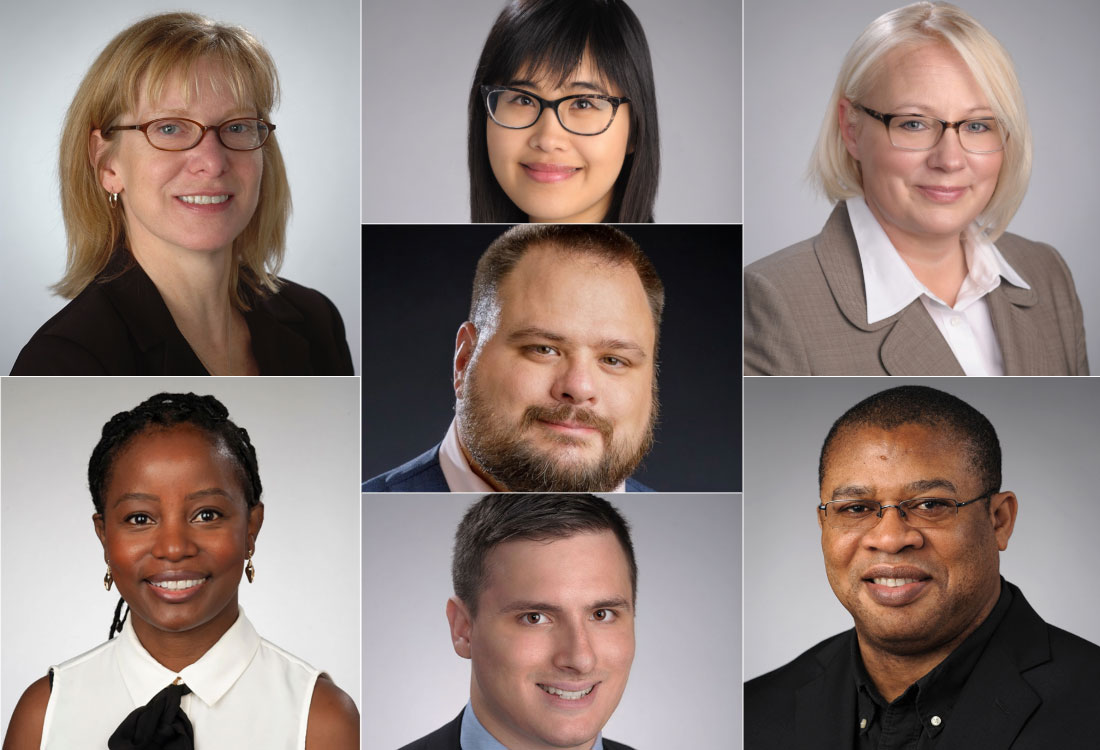
The Falk College of Sport and Human Dynamics is proud to share that the following seven faculty members received promotions and/or were granted tenure:
Jason DeFreitas, Exercise Science
Awarded Tenure
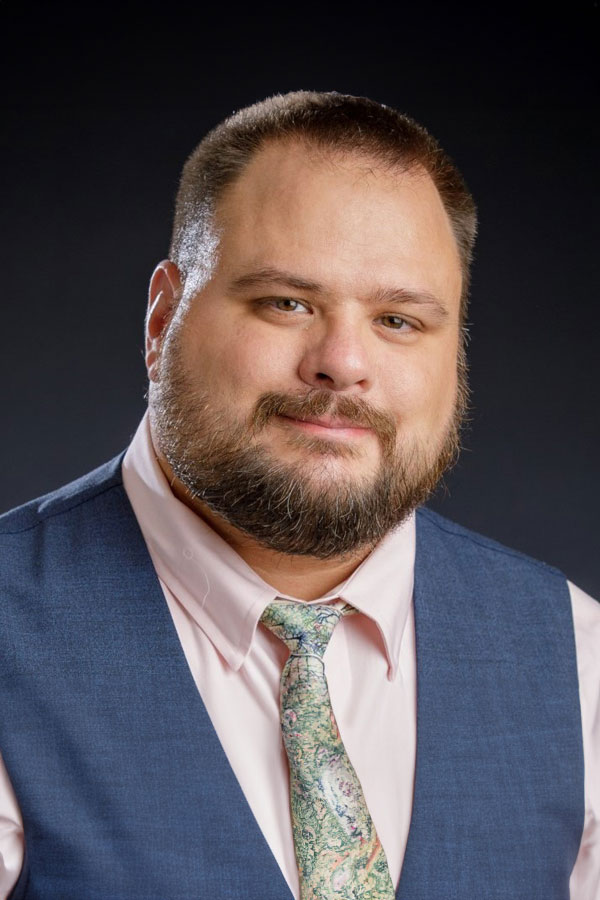
Jason DeFreitas, Ph.D., joined Falk College in the Department of Exercise Science as a professor and department chair in 2024. He earned his Ph.D. and master’s degree from the University of Oklahoma, where he later became a faculty member, spending 11 years teaching classes primarily focused on neuroanatomy and neuromuscular physiology.
His research focuses on how the brain controls movement and how aging and training change that control system. While at Oklahoma State, he won several university-wide awards for his research.
DeFreitas was among the second cohort of the Hevolution/AFAR New Investigator Awards in Aging Biology and Geroscience Research, a grant program that enables early career investigators with labs in the United States and Canada to advance research projects in basic biology of aging and geroscience projects that pave the way for healthspan-expanding therapeutics and treatments.
“Dr. DeFreitas has established himself as a highly productive scholar in neuromuscular physiology and exercise neuroscience,” says Falk College Dean Jeremy Jordan. “His publication record demonstrates both quantity and quality, with 91 peer-reviewed articles that have garnered over 2,500 citations. Of his total publications, he has maintained first or senior author position on 54 percent of papers, demonstrating his leadership role in research collaborations.”
Ignatius Ijere, Public Health
Promoted to Teaching Professor
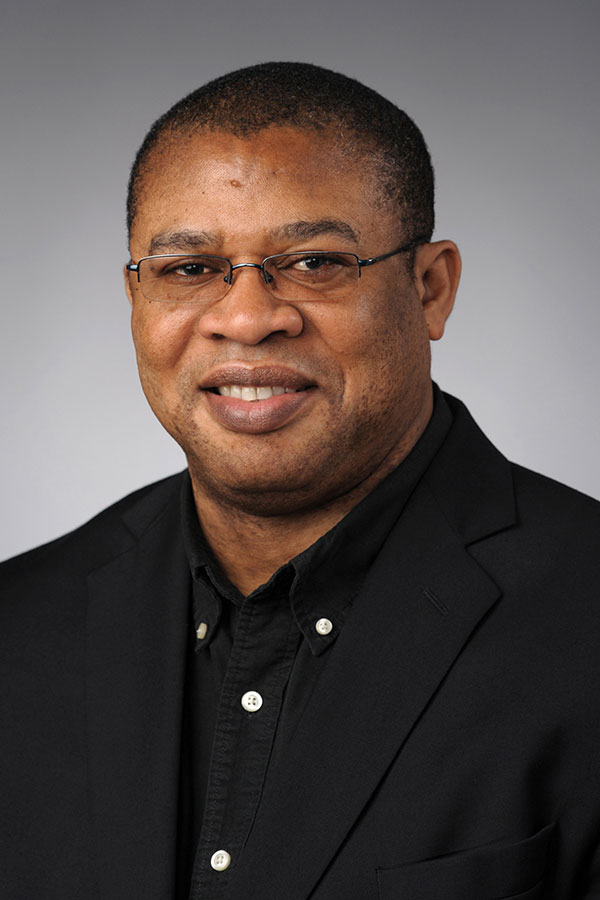
His expertise is in the areas of mental illness and addiction with professional experience as a mental health and addiction counselor with the Gateway Foundation and Thresholds Psychiatric Rehabilitation Centers. He previously served as an adjunct faculty member in the Department of Public Health at the College of DuPage, Waubonsee Community College, and St. Augustine Community College.
“Peer and student evaluations of Dr. Ijere’s teaching performance are consistently positive and describe a deeply respectful professor who cares about student well-being,” Department of Public Health Chair David Larsen says. “They also a describe an approach to teaching which is skillful, particularly when it comes to organizing complex and/or difficult material in ways that students can understand. Dr Ijere has taught an incredibly diverse menu of courses, and I laud his willingness to step in and teach courses on overload that are critical to department success.”
Jeremy Losak, Sport Analytics
Promoted to Associate Professor with Tenure
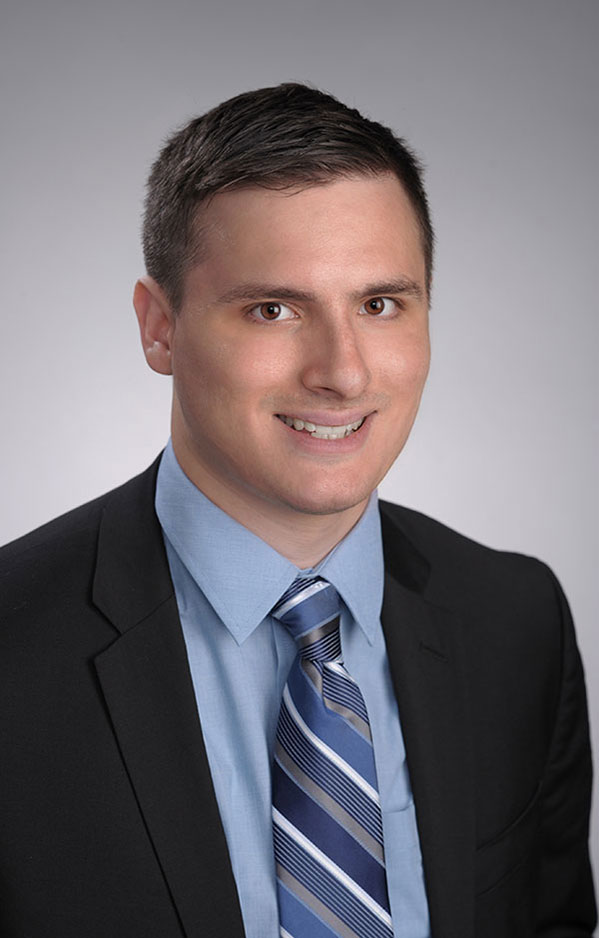
He is one of the faculty members who organizes and runs the Berlin Sports Analytics Academy, a program that brings high school students from across the country to Syracuse University over the summer to provide them with an immersive, hands-on college preview.
“Jeremy is an outstanding teacher and mentor, known for his dedication to student success both inside and outside the classroom,” says Sport Management Professor Rodney Paul, Ph.D., director of the Sport Analytics program. “His engaging teaching style and accessibility have made a lasting impact on the Sport Analytics program.
“Jeremy’s research spans sport economics, sports betting, and fantasy sports, with work published in leading journals such as the Journal of Sport Economics and the International Journal of Sport Finance,” Paul adds. “This is a well-earned recognition of his contributions across teaching, mentoring, and scholarship. Congratulations, Jeremy!”
Miriam Mutambudzi, Public Health
Promoted to Associate Professor with Tenure
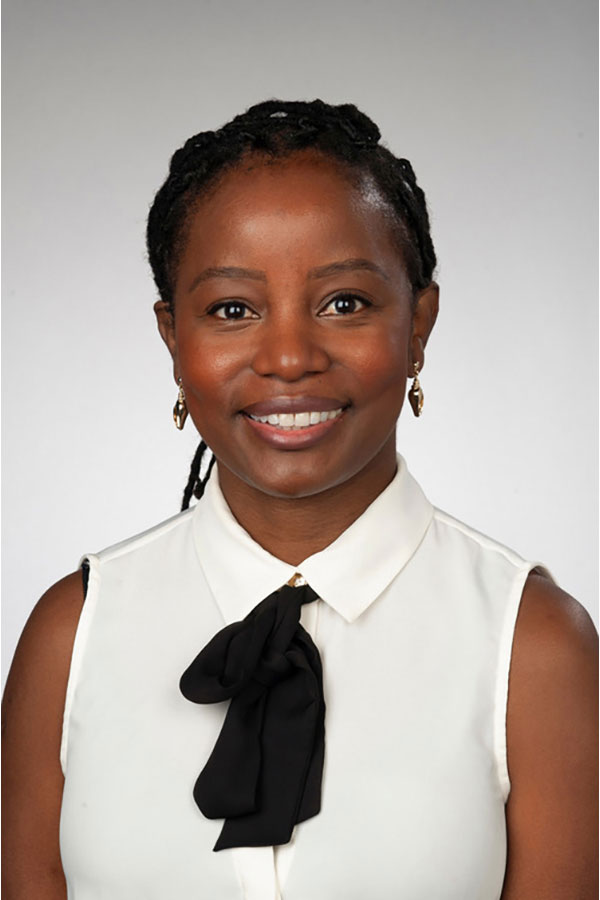
Prior to joining Syracuse University, Mutambudzi served as a research associate in the MRC/CSO Social and Public Health Sciences Unit at the University of Glasgow in Scotland, and a guest epidemiology professor in the Department of Epidemiology and Social Medicine at the University of Antwerp in Belgium. She has published extensively in peer-reviewed journals, including the European Journal of Ageing, Journal of Gerontology: Medical Science, and the Journal of Occupational and Environmental Medicine.
“Dr. Mutambudzi has established herself as a leading scholar in life-course epidemiology, with expertise in examining how socially patterned exposures and cumulative biological burden influence disease risk and health outcomes in older adults,” says Falk College Dean Jeremy Jordan. “Her research portfolio demonstrates both impressive productivity and significant impact on the field.”
Lisa Olson-Gugerty, Public Health
Promoted to Teaching Professor
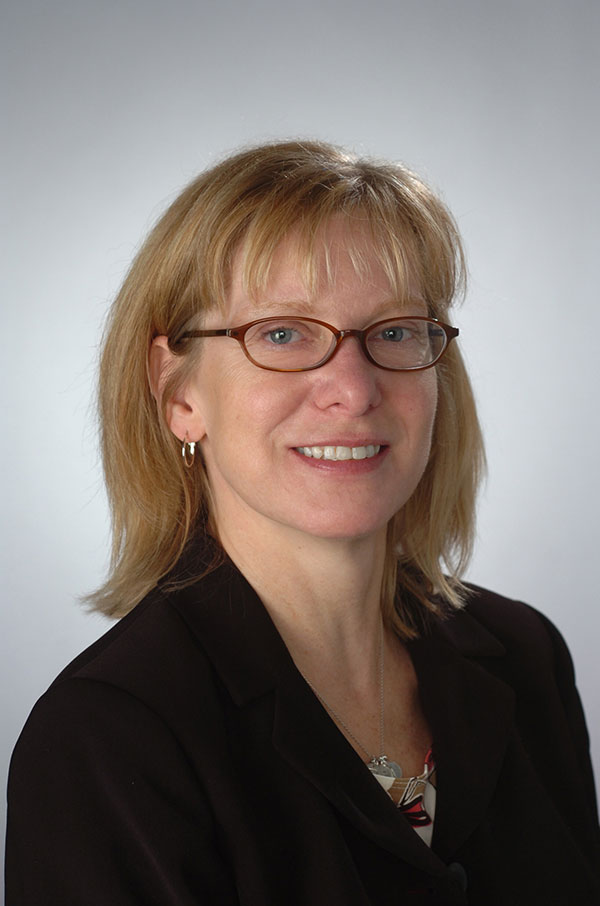
Olson-Gugerty is a nurse practitioner who maintains an outside practice as an emergency healthcare provider at a regional community healthcare center. She earned her Doctor of Health Science (D.HSc.) from Nova Southeastern University, and she also holds a Master of Public Health from the University of South Florida, a master’s degree in Nursing, Family Primary Care, from SUNY Upstate Medical University, and a bachelor’s degree in health science from SUNY Cortland.
Olson-Gugerty has served as a faculty thought leader by granting interviews to several top media outlets, including most recently ABC News, Yahoo Life, and Parade.
“Professor Olson-Gugerty has a background as both a practicing clinician and an academic,” says Department of Public Health Chair David Larsen. “This has informed her teaching philosophy, which emphasizes real word applications and the development of student critical thinking skills. She is dedicated to the student experience and works to create an inclusive and welcoming classroom environment.”
Stefanie Pilkay, Social Work
Promoted to Associate Professor with Tenure
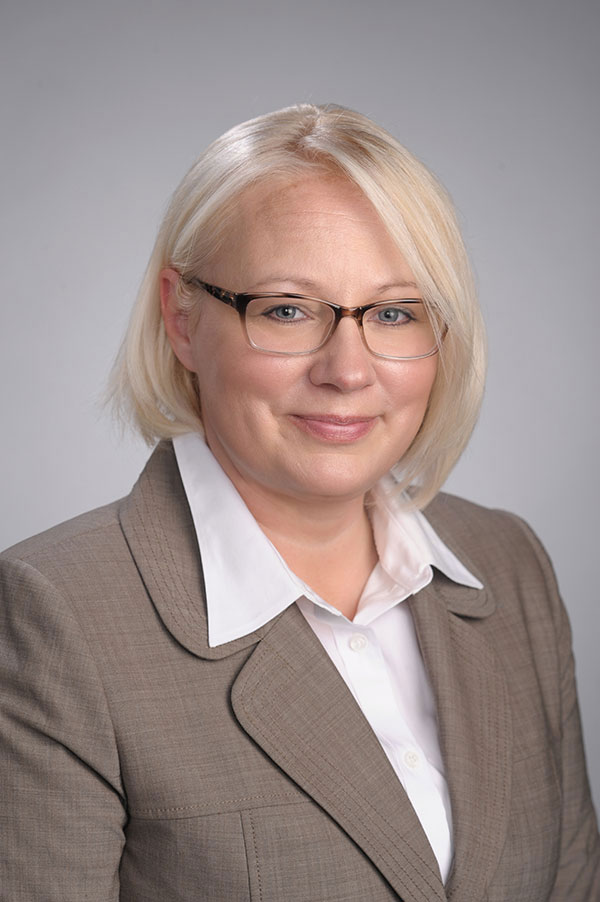
Pilkay’s scholarship addresses longstanding needs to better understand the relationships between adversity, epigenetic changes, and developmental outcomes including health and behavior to improve treatment and prevention outcomes for children and adolescents with health and behavioral issues exposed to poverty, stress, and environmental toxicants. Dr. Pilkay’s pioneering studies have been published in peer-reviewed journals, and her work has been supported by external grants. She has investigated particularly important questions of relevance to social work and genetics, especially in her pioneering work on trauma and its impact on gene expression.
“Dr. Pilkay is an exceptional addition to our faculty, and we are thrilled to welcome our newest colleague to our ranks!” says School of Social Work Chair Carrie Jefferson Smith.
Xiafei Wang, Social Work
Promoted to Associate Professor with Tenure
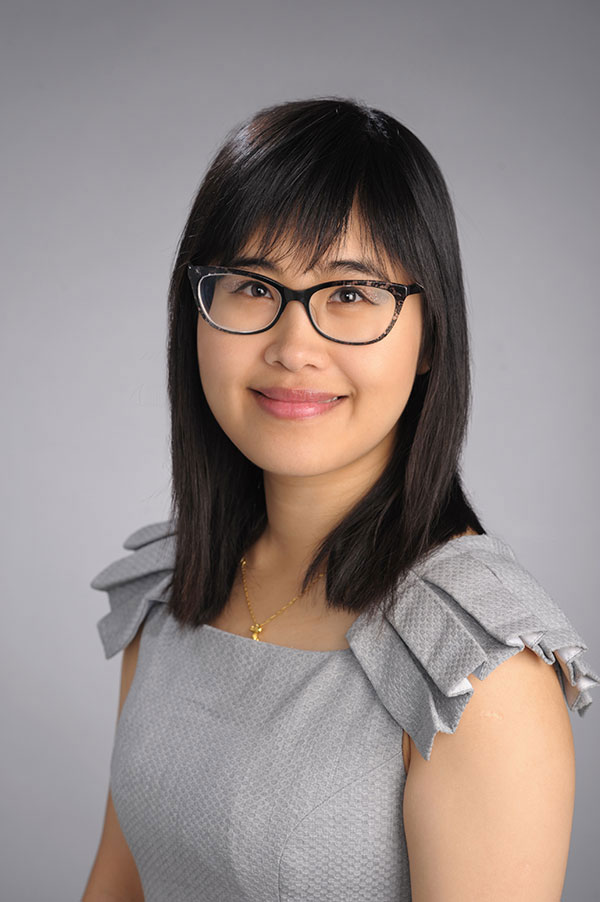
Wang’s scholarship addresses childhood trauma, intergenerational transmission of trauma, resilience, and the roles of race, gender, rural culture, and military experiences. Her work provides direct implications for designing programs and policies for diverse people experiencing trauma.
Awarded the Falk College Faculty of the Year Award for Excellence in Research in 2021, Wang has published extensively in high-impact journals and in chapters of peer-reviewed books. She has established a robust record of external funding from notable sources, including the Health Resources Services Administration and National Institute of Health.
“Dr. Wang has contributed substantially to the teaching and service environments of our program,” School of Social Work Chair Carrie Jefferson Smith says. “We are delighted to welcome Dr. Wang as a fully tenured colleague, and we anticipate a bright future as she continues to influence future directions in our understanding of trauma.”
As part of Syracuse University’s go-forward plan announced this past fall for the Falk College human dynamics programs, the Department of Public Health will join the Maxwell School of Citizenship and Public Affairs and the School of Social Work will be housed in the School of Education starting July 1, 2025.
2025 Falk College Convocation
The celebration included two members of Syracuse University’s Board of Trustees, Ken Pontarelli and Deborah Leone, who had family members graduating from Falk, and a surprise visit from Otto the Orange, who helped Falk College Dean Jeremy Jordan take a selfie in front of all the graduating students!
Watch the slideshow above for photos from Convocation, and visit the Syracuse University Commencement website to watch the full Falk Convocation ceremony.
Guest speaker Benita Fitzgerald Mosley, an Olympic gold medalist and visionary executive, delivered an inspiring speech during which she encouraged graduates to ask “Why not me” when they dream about the goals they have set for their careers and personal lives. Here’s a video and story to learn more about Fitzgerald Mosley.
Dean Jordan reminded the graduates that they follow generations of Syracuse University alumni who refused to settle, pursued innovation, and conquered the challenges of their time. Now, it’s their turn.
“The worlds of sports, human performance, and applied and behavioral health are evolving rapidly,” Jordan said. “To become effective leaders, you must evolve with them—and I have every confidence you will.
“At Syracuse University and Falk College, we have strived to prepare you to meet these challenges head-on and become the change agents our world desperately needs,” he continued. “The education you’ve received here has equipped you with the tools to make meaningful contributions in your chosen fields. Your unique perspectives, innovative thinking, and commitment to excellence will undoubtedly lead to breakthroughs that improve lives and communities.”
Class of 2025 Falk College Scholars
Seven members of the Class of 2025 have been named Falk College Scholars–the highest academic award conferred by the Falk College of Sport and Human Dynamics on graduating seniors. Falk Scholars represent undergraduate students who display academic excellence, exceptional campus and community engagement, independent research and creative work, innovation in their disciplinary field, and personal integrity.
We asked the Class of 2025 Falk Scholars to describe their most impactful experiences at Syracuse University. Here’s what they wrote:
Grace Elizabeth Brashears (Human Development and Family Science)
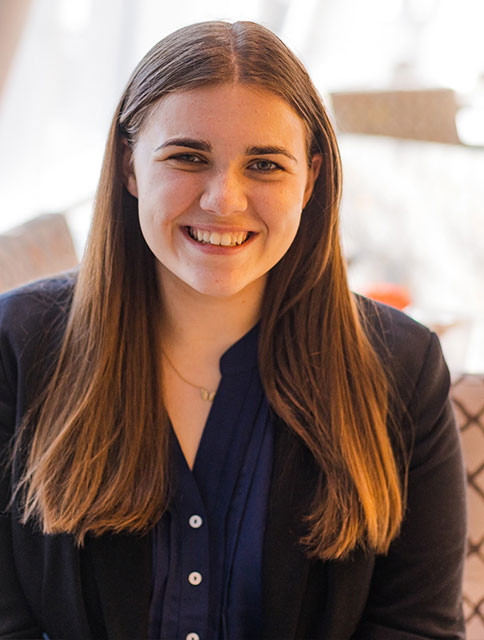
Throughout my time at Syracuse University and Falk College, I have been honored to take part in various service initiatives that help the very community I have called home for the last four years. The most influential of these was my work with Upstate Golisano Children’s Hospital as a Child Life Practicum student, and as president of OttoTHON at Syracuse University. In my time with OttoTHON, I have led a generation of students to raise over $400,000 for Upstate Golisano Children’s Hospital.Alongside my work with Golisano Children’s Hospital, I have been given the opportunity to impact my community through assisting in research that is developing more accessible research ethics training for individuals with intellectual and developmental disabilities. Additionally, I have worked with various organizations in Syracuse, including the Boys and Girls Club, RISE (Refugee and Immigrants Self-Empowerment program), beneath the surFACE at Upstate Cancer Center, Syracuse Red Cross, the Children’s Advocacy Center, Upstate Community Hospital, and more.
These opportunities, heavily supported by Syracuse University and Falk College, have successfully set me up for a lifetime of service and philanthropy, and a fulfillment of my purpose to use my education to benefit the lives of those around me. I will never forget my time at Syracuse and a part of me will always be here on the hill. Go Orange!
Xuezhu “Stephanie” Hua (Nutrition Science)
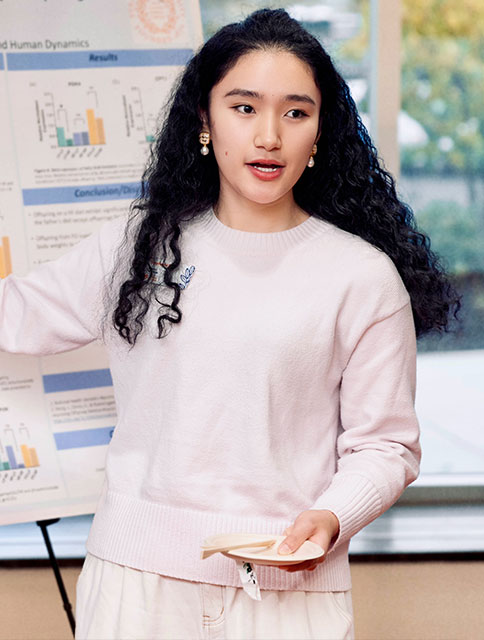
When I was a sophomore, I led a dorm room recipe project through the Office of Student Services in Falk College. The goal was to introduce healthy, easy-to-make snacks that people could take with them to class or work. I created three recipes—chocolate bark, microwave cake, and banana wraps—and prepared 100 samples. I presented these to students and faculty from Falk College, explaining the nutritional benefits and preparation methods. I found this experience incredibly rewarding and empowering as it allowed me to apply my knowledge to help others improve their health and well-being. It instilled in me a lasting commitment to use my expertise to make a meaningful impact in the community.
Another inspiring experience was my honors thesis done in Dr. Latha Ramalingam’s lab, where I investigated the effects of fish oil in reducing paternal obesity and improving muscle health in male offspring. This project was both inspiring and transformative—it was where I discovered my passion for biomedical science. Combined with foundational coursework such as Dr. Margaret Voss’s biochemistry class, anatomy, and physiology, I developed a deep passion and appreciation for the complexity and intricacy of human metabolic physiology—and the many avenues through which we can address disease. These experiences shaped my path toward studying metabolic diseases and cellular metabolism, fields where my passion aligns with pressing global health challenges.
Benjamin Lanza Jennings (Sport Analytics)
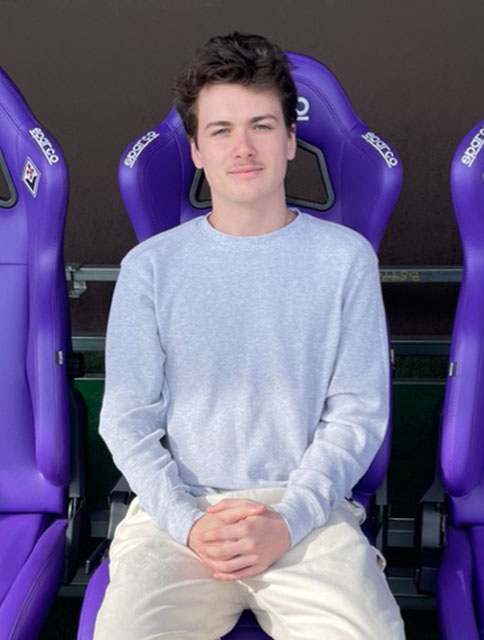
Being named a Falk Scholar is an incredible honor and a reflection of the meaningful experiences I have had at Syracuse University. I have always been passionate about working in sports, and Falk College gave me the tools, support, and guidance to pursue a career in sport analytics.One of the most memorable experiences was traveling to Italy as part of the first Sport Data in Italian Football course. I learned a ton about analytics in a global context, was immersed in the Italian culture, and had the opportunity to deliver a data-driven presentation to the Bologna FC professional soccer team.
Working with Syracuse’s football and women’s soccer teams gave valuable hands-on experience in sports I am truly passionate about. Winning the 2024 Syracuse University Basketball Analytics competition helped me grow both technically and creatively. All of these opportunities provided me with the skills and confidence to succeed with professional organizations.
I am incredibly grateful to the professors, advisors, and staff at Falk College who encouraged me, opened doors, and helped me prepare for what’s next. Syracuse University and the Sport Analytics program made it possible to turn my passion into a path forward in the sports industry.
Jarrett Markman (Sport Analytics)
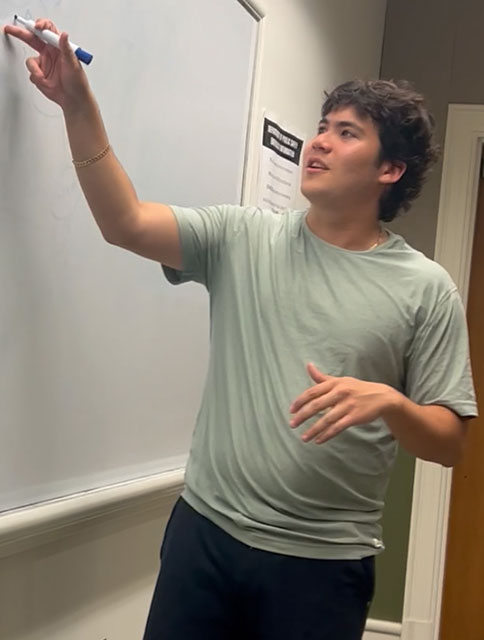
The most impactful experience I’ve had at Syracuse University was the opportunity to develop a passion for learning. In the Sport Analytics program, I was able for the first time to blend my passion for academics (math-based work) with one of my favorite hobbies, sports. The program provides many learning opportunities, such as the many academic clubs presented to students in the major.Given my background playing tennis at a high-level, I was interested in creating my own club and combining my abilities as a tennis player and sport analyst. Due to the lack of popularity in tennis across the country compared to other sports, we built a close-knit group of members who discussed a variety of the technical and physical aspects of tennis that come from the perspective of playing, watching, and analyzing.
In our club, we utilized the knowledge gained from our coursework and applied that to various aspects of tennis. The Tennis Analytics Club has heightened my passion for learning, leveraging the power of data science (notably statistics), machine learning, and programming to identify the various ways to formulate powerful insights.
Anna Meara Pierce (Sport Analytics)
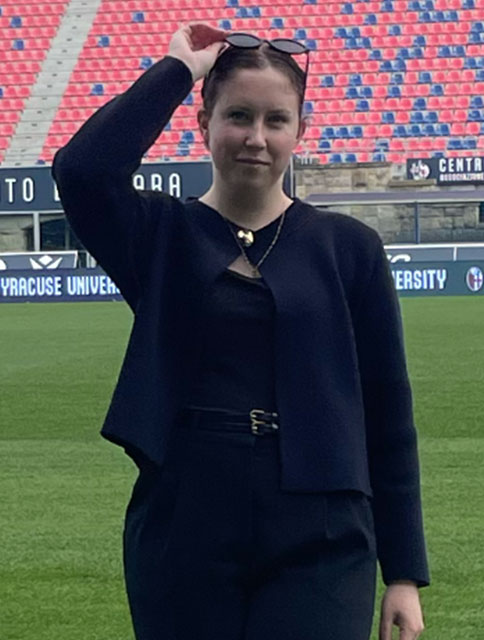
A lot of the impactful experiences I’ve had at Falk and Syracuse University have been on a smaller level, including the support of my professors and advisors. However, I’ve been lucky enough to go on several department-sponsored trips to conferences or other sport-related events.One such event was the 2024 NFL Draft in Detroit. The Sport Analytics and Sport Management teams used a previous connection with one of the community tourism-related groups organizing the draft to take six of us (three analytics students and three management students) to work the draft in areas from combine-related fan activations to manning the information desk. While I already knew that I wanted to work in fan engagement within the sport, the draft opened my eyes to the potential reach and success of a tent-pole event such as the draft, as well as to the world of fan engagement and events within football.
Ultimately, this trip showed me the possibilities for impact on the business side of the NFL and its teams, driving me to take a position with the Green Bay Packers in their business analytics department for post-graduation.
Nicole Yanza Shanguhyia (Public Health)
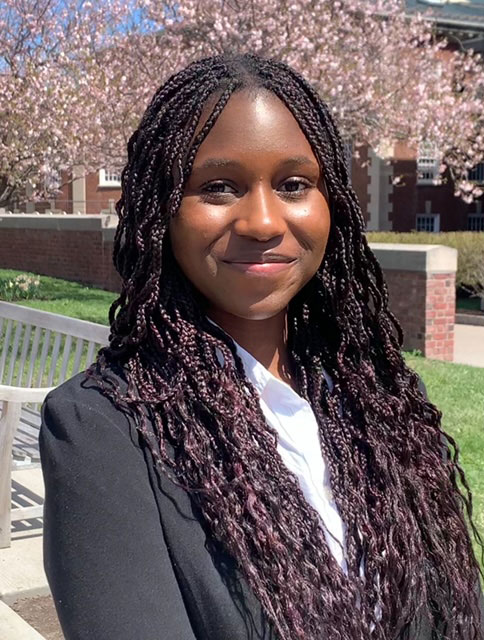
During my time at Syracuse University I’ve had the opportunity to meet a lot of wonderful people, but none quite like the members of the Student Association of Public Health Association. The designated student organization for the Department of Public Health, better known as SAPHE, was first introduced to me in my sophomore year.When Professor Lisa Olson-Gugerty announced she was reviving the student-run club, I wasu admittedly hesitant to join. At this point, I had yet to grow close to anyone in my major and was unsure of how welcoming other students would be. To my surprise, SAPHE evolved into the highlight of my time in public health. Through my involvement in the club, I deepened my understanding of health awareness by planning semester-long initiatives and on- and off-campus activities.
But more importantly, I formed lasting connections with so many incredible people in my major. Because of SAPHE, I could look around my classes and find comfort in familiar faces. As I’m preparing to move forward and reflect on my experiences at Syracuse University, I can say with confidence that the members of SAPHE represent the best that my department has to offer.
Jonah Aaron Soos (Sport Analytics)
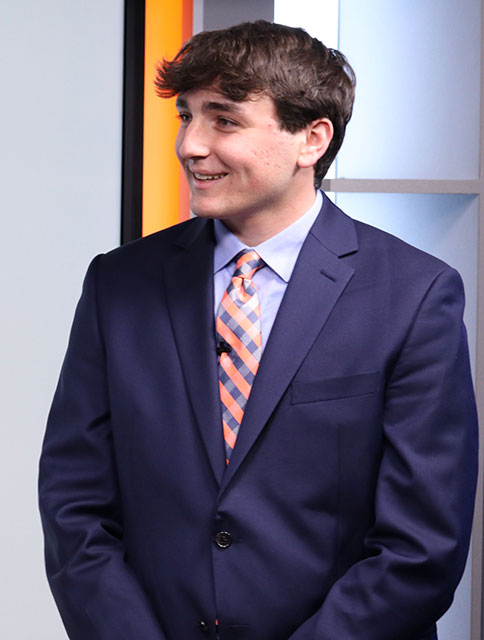
The moment that stands out during my journey at Falk College was the privilege of experiencing different parts of the sports industry across the country. Through research and case competitions, I have had the opportunity to visit multiple cities to network with students and professionals from around the country, experience new cultures, build bonds with fellow students, and have a chance to represent Syracuse and compete against top analysts nationwide.My most impactful trip was attending the Society for American Baseball Research (SABR) Analytics Conference in Phoenix, Arizona, each of the past two years with 20 other Syracuse students to compete in the Diamond Dollars competition and present some of my own research on Major League Baseball umpires and the challenge system.
Working closely with my peers has created a sense of community within Falk College, for which I’ll always be grateful, and has helped me make lifelong friends and many incredible memories. I’m excited to return to Phoenix as an alum and watch future generations of Falk students compete, and I’m also excited to see how they can one-up what we accomplished!
Class of 2025 Human Development and Family Science Awards
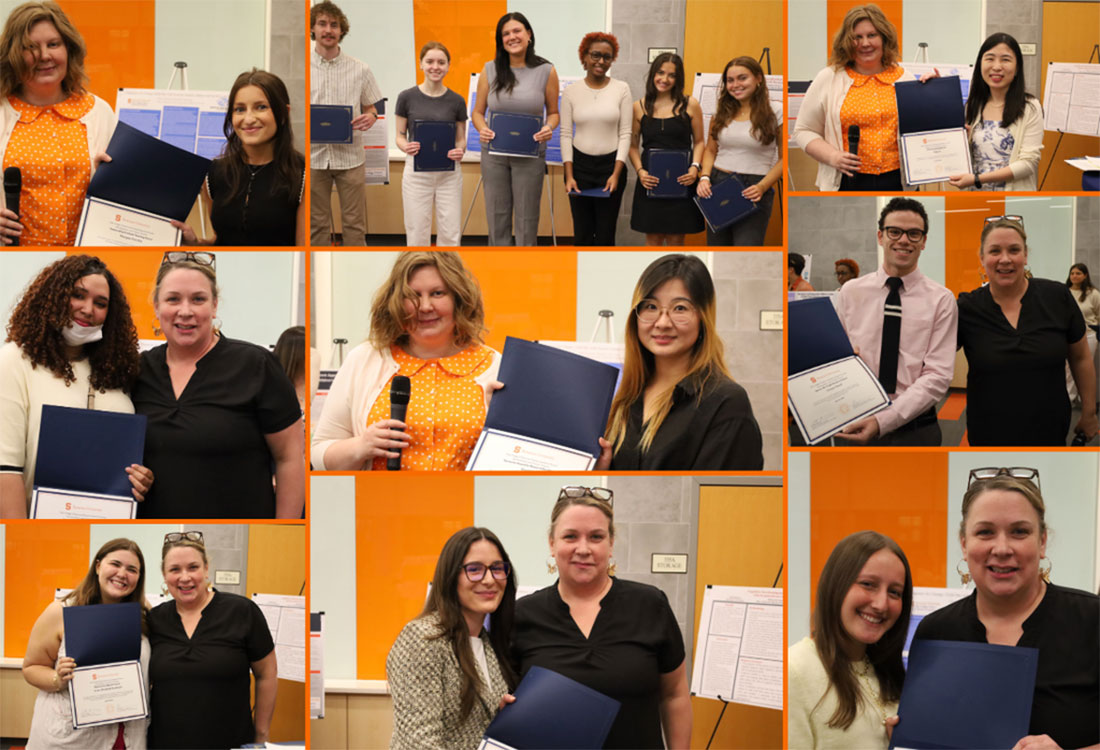
The Department of Human Development and Family Science in the Falk College of Sport and Human Dynamics recently honored several undergraduate and graduate students with department awards.
“You’ve poured your time, your energy, your compassion, and your curiosity into a field that is as demanding as it is deeply meaningful,” Undergraduate Director and Professor of Practice Colleen Cameron told the students at the awards ceremony.
“What you’ve chosen to study goes far beyond textbooks. You’ve explored the complexities of human relationships, the resilience of families, and the beauty of development across the lifespan,” Cameron added. “You’ve learned how to meet people where they are, how to listen with intention, and how to support others through life’s most challenging and rewarding moments. That’s no small feat.”
The Department of Human Development and Family Science (HDFS) recognizes the outstanding work of the following students:
Undergraduate Awards
Bernice M. Wright Memorial Award
Recipient: Cooper Knoll
About Cooper: Throughout Cooper’s time at Syracuse, he has received multiple honors, including the HDFS Outstanding Freshman Award, the Success Scholar Award, the Orange Distinction Award, and membership in the Kappa Omicron Nu Honor Society. He has served on the Dean’s Committee on Diversity and Inclusion and participated in the Falk New York City immersion trip. His academic journey has been deeply enriched by hands-on experiences, from interning at the Bernice M. Wright Lab School and AccessCNY, to working at the Golisano Center for Special Needs, where he supported children with neurodevelopmental disorders through behavioral strategies and one-on-one interventions. His experiences have reinforced his passion for inclusive education and child advocacy.
Elizabeth Manwell Memorial Award
Recipient: Reese Kutin
About Reese: Throughout her academic career, Reese has consistently earned Dean’s List honors. She has built a strong foundation in healthcare through hands-on clinical experiences at medical institutions, including St. Joseph’s Health Hospital, New York University Langone Health, and SUNY Upstate Medical Hospital. Her volunteer and internship work in both pediatric and surgical settings has deepened her passion for nursing and strengthened her commitment to providing compassionate, patient-centered care. Reese believes nursing is a unique opportunity to blend science, empathy, and human connection to make a meaningful impact on patients’ lives. As she faces the challenges and rewards that come with the responsibility of caring for others in healthcare settings, she will be an extraordinary advocate for the psychosocial well-being of patients and their families.
Florence B. Potter Memorial Award
Recipient: Nicole Serrano
About Nicole: At the heart of every role Nicole has undertaken—whether in the classroom or community— is her steadfast commitment to service. Her education has deepened her understanding of how meaningful relationships and intentional support can impact lives. Nicole has seen firsthand how acts of care and encouragement can foster supportive relationships. Nicole has a natural ability to meet others where they are, with compassion and reliability, and ensuring all feel seen, valued, and supported.
Ruth Tolley Award
Recipient: Anna Lupardo
About Anna: Anna is part of the Renée Crown Honors Program and has consistently earned a spot on the Dean’s List. With a passion for understanding people and making a difference in their lives, Anna realized she wanted to dedicate her career to serving our nation’s veterans and military families. Her hands-on experiences range from human resources internships and early childhood education to freelance writing and social media management. She has been actively involved in research, community engagement, and DEI education. This fall, Anna will intern with Betty and Michael D. Wohl Veterans Legal Clinic at the Syracuse College of Law as part of her HDFS practicum. Her focus on justice involvement, chronic pain, and behavioral health among U.S. veterans is commendable, and we look forward to her bright future in law.
Selleck Award / HDFS Undergraduate Department Marshal
Recipient: Alexandria Rae Fabrizi
About Alexandria: “Ali” is a Gilman Scholar, a past recipient of the Ruth Tolley Award, and a member of prestigious societies such as the National Society of Collegiate Scholars and Kappa Omicron Nu. Throughout her academic journey, she has participated in several enriching experiences, including studying abroad at the University of Sydney in Australia, where she engaged with local youth in foster care. She has completed multiple internships that have provided her with hands-on experience in youth and human development, including roles at the Golisano Center for Special Needs, ARISE Adaptive Design, and Hope for Bereaved. These internships have allowed Ali to contribute meaningfully in areas such as behavioral analysis, grief management, and adaptive equipment design. Her experiences at Syracuse University have shaped her professional goals and fueled her passion for supporting children and families, especially those facing adversity.
Shannon Davis Memorial Award / Falk College Scholar
Recipient: Grace Elizabeth Brashears
About Grace: Throughout Grace’s academic journey, she has maintained a strong commitment to academic excellence, community service, and leadership. Grace is a Success Scholar and recipient of the Robert B. Menschel Public Service Award. Grace’s experience spans across a variety of internships and research roles, most notably as a Child Life Specialist practicum student at Upstate Golisano Children’s Hospital, where she supported pediatric patients and their families through therapeutic play and emotional support. Additionally, Grace has worked with the Children’s Advocacy Center in Michigan, focusing on forensic interviews for child survivors of sexual violence, and at the Children’s Healing Center, where she helped create social-emotional programs for immunocompromised children. Beyond internships, Grace has been deeply involved in community service and campus leadership. As Executive Director of OttoTHON, she led fundraising efforts to benefit Upstate Golisano Children’s Hospital.
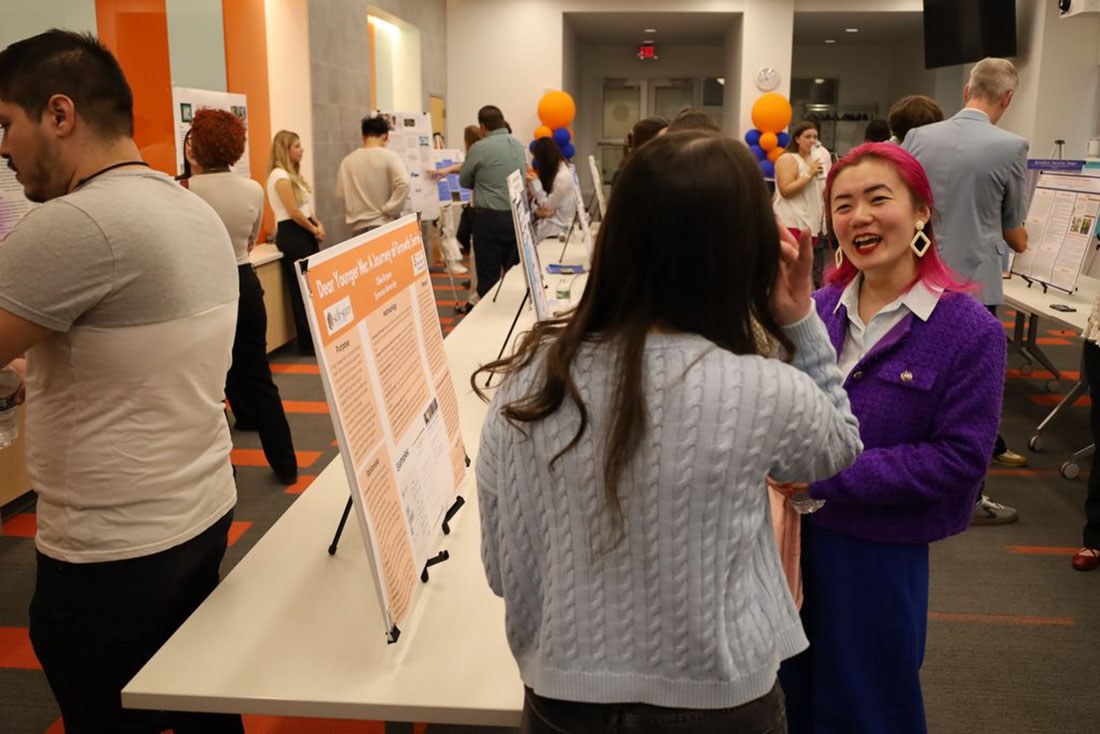
Graduate Awards
Alice Sterling Honig Award / Graduate School Outstanding Teaching Assistant
Recipient: Ying Xu
About Ying: This award, which is presented to a graduate student who has demonstrated outstanding scholarship in child development and family studies, recognizes the legacy of HDFS Professor Emerita Alice Sterling Honig. Ying is active in research on children and families, and her first-authored paper, “Intergenerational Transmission of Corporal Punishment: A Systematic Review,” was recently accepted by “Trauma, Violence, and Abuse.” She is working with HDFS faculty on several other publications focused on adverse childhood experience, grandparent caregiving, and intergenerational relationships.
The Graduate School Outstanding Teaching Assistant Award is a University-wide award that recognizes teaching assistants who have made distinguished contributions to Syracuse University by demonstrating excellence in significant instructional capacities.
HDFS Doctorate Award for Research Excellence
Recipient: Wusirige
About Wusirige: The HDFS Doctorate Award for Research Excellence is presented to a doctoral student who has excelled in academic achievement, research practice, and leadership. Wusirige recently published a paper on marital satisfaction and co-parenting in infancy, and has several other papers under review that focus on parenting stress and satisfaction and other processes for families in Gyana and Jamaica.
HDFS Outstanding Graduate Teaching Award
Recipient: Morgan Parella
About Morgan: This award is presented to a graduate student who demonstrates a strong commitment to teaching and learning. Morgan was nominated for her work as a teaching assistant, and her supervisor for the course writes: “Morgan played a significant role in ensuring the smooth functioning of the course. She was an exceptionally effective and timely grader, providing students with clear, constructive feedback that supported their learning. Just as importantly, Morgan made herself consistently available to students, responding to questions with care and clarity. Her dependability, attention to detail, and student-centered approach were instrumental in helping students meet the learning goals of the course.”
Graduate School Marshal / All-University Doctoral Prize / Chancellor’s Citation for Excellence for Graduate Student Research
Recipient: Qingyang Liu
About Qingyang: Selection of the Graduate School Marshal is based on a review of nominees’ research and other academic accomplishments, as well as consideration of the student’s past service to the department and University. The marshal assists with hooding fellow Ph.D. candidates during the hooding ceremony and will lead the Ph.D. candidates into Syracuse University’s Commencement ceremonies. Qingyang has an extensive publication record focused on poverty, adversity, and children’s self-regulation. She recently defended her dissertation entitled “Behavioral Self-Regulation in Context: Timing, Types, and Changes of Material Hardship Across Childhood.” Her work utilizes innovative statistical methods and has strong policy implications.
For her excellence in research, Qingyang also received the All-University Doctoral Prize and the Chancellor’s Citation for Excellence for Graduate Student Research, two prestigious university-wide honors.
HDFS Graduate Department Marshal
Recipient: Linghua Jiang
About Linghua: The graduate marshal’s primary role is to lead the department in the Falk College Convocation. Linghua has a distinguished record of research in adolescent development with several publications in high-ranking journals. Her work makes use of advanced methods such as latent class analysis and the time-varying effect model, and she seeks to understand associations between adverse childhood experiences and mental health. She recently defended her dissertation entitled “Exploring the Longitudinal Impact of Patterns of Adverse Childhood Experiences (ACEs) on Later Psychological Outcomes.” She completed her dissertation while serving as an instructor for our adolescent development class.
Faculty of the Year Awards
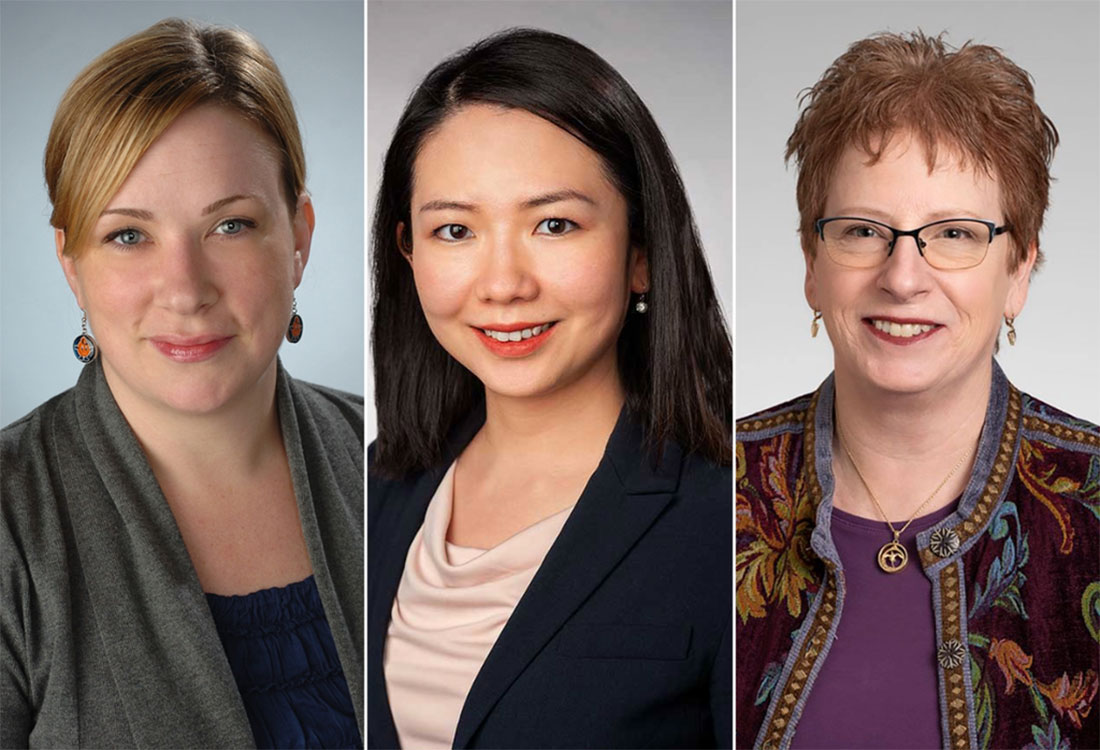
Mary Kiernan, Colleen Cameron, and Fei Pei were honored with 2025 Falk College of Sport and Human Dynamics Faculty of the Year awards for excellence in teaching, service, and research, respectively. The honorees were nominated by their peers for outstanding teaching, scholarship, and internal and professional service contributions and announced by the Falk College Faculty Council in late April.
Here’s a look at the 2025 honorees with comments from their award presenters:
Chef Mary Kiernan, M.B.A.
Undergraduate Director, Food Studies, and Teaching Professor, Nutrition and Food Studies
Evan Weissman Memorial Faculty of the Year Award for Teaching Excellence
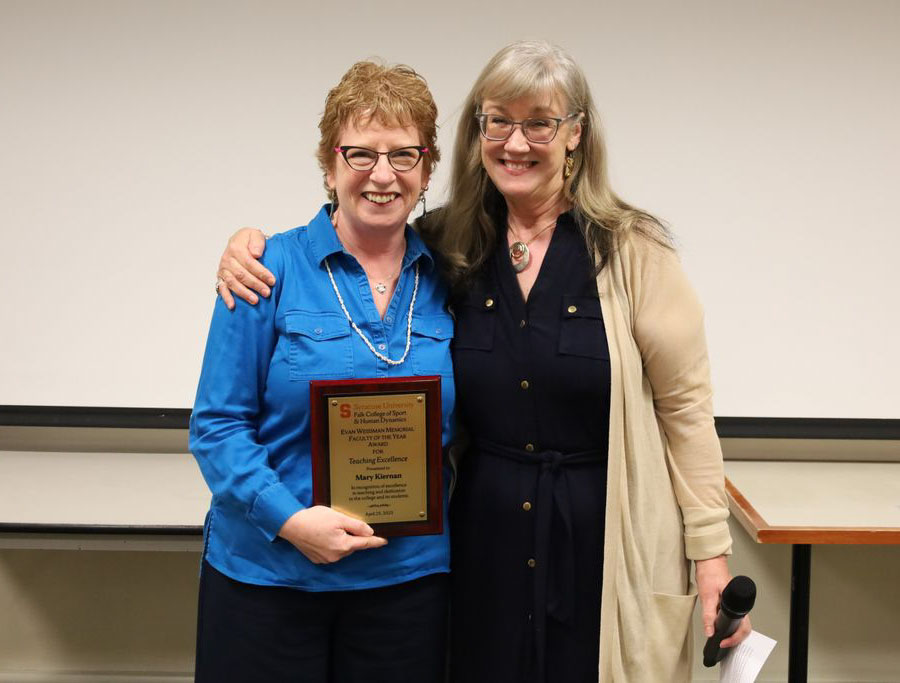
“It’s hard to imagine a more fitting honoree for an award that bears Evan’s name. In so many ways, Mary embodies Evan’s philosophy—his passion for student mentorship, commitment to teaching, dedication to social consciousness, and, of course, his dedication to food studies.
“Mary is a Teaching Professor in the Department of Nutrition and Food Studies, where she is known for transforming her classrooms into dynamic, immersive spaces. Her courses—spanning food safety, systems management, and urban food systems—equip students with essential technical skills while also challenging them to explore the social, cultural, and ethical dimensions of food.
“What truly distinguishes Mary in the teaching kitchen is her ability to bridge theory and practice. Whether she’s redesigning core curricula, mentoring independent projects, or advising students, she brings clarity, creativity, and compassion to everything she does.
“Her leadership as Undergraduate Director for the Food Studies program, her engagement with professional networks, and her commitment to inclusive, culturally rich programming and hands-on culinary experiences enrich our campus and our community. Mary’s work exemplifies excellence in education—and the spirit of this award.”
Learn more about Evan Weissman, Ph.D., Associate Professor in Food Studies and Nutrition who passed away in 2020.
Colleen Cameron, CCLS, M.Ed.
Undergraduate Director and Professor of Practice, Human Development and Family Science
Faculty of the Year Award for Excellence in Service
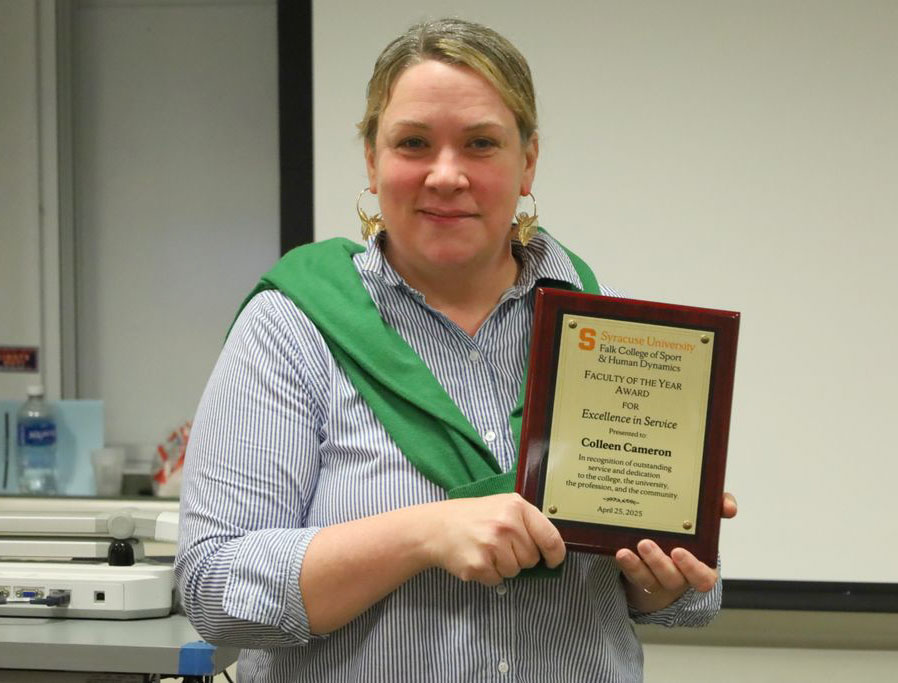
From presenter Tracey Reichert Schimpff, M.A., Ph.D., LMFT, Graduate Director and
Associate Teaching Professor, Department of Marriage and Family Therapy:
“Colleen is a Professor of Practice in the Department of Human Development and Family Science (HDFS), and a certified Child Life Specialist and End of Life Doula. She has been with Syracuse University since 2009, serving students, her Department, and the field.
“Her nomination letter states, ‘Colleen has always exemplified the very best of student-focused work and a commitment to our students and program. She is uniquely and wholly committed to the success of our students and has always gone above and beyond. Overall, Professor Cameron’s service work has been exceptional both in its breadth and in its impact.’
“In the nomination materials, it was noted that Colleen’s signature service is heading the Child Life program. It is an endorsed program that leads graduates to become certified Child Life Specialists. This requires knowledge of requirements, oversight of curriculum, and guiding students through the process that leads to certification. Colleen single-handedly ensures that this program continues.
“This past year, Colleen also served as Undergraduate Director in HDFS, managing curriculum, working with admissions and marketing, and engaging directly with students (and sometimes families). In a year of transition, I imagine this has been quite an undertaking!
“In HDFS, Colleen also serves as faculty advisor and chair of the Student Engagement Committee, which was created to increase student voice and connection. From what I understand, this committee has grown, and students have benefited greatly from Colleen’s dedication. Colleen served as mentor for Renee Crown honors students and led the HDFS New York City Career Immersion Trip, a trip that is highly regarded by HDFS students.
“In addition to the significant roles she plays in HDFS, Colleen also served at college and university levels. In 2024, Colleen was selected to serve on the Human Development Task Force. She was very committed to the process, and worked diligently to gather information and advocate for her department.
“Collen serves on the Syracuse University Senate and its Research and Creative Scholarship Committee. Collen is also engaged in service to her profession, acting as Director of the Conference Committee and Co-Chair of the Clinical Experience Task Force for the Child Life Academic Society. Finally, Colleen has even found time to volunteer at her school district and community council.
“It seems obvious that Colleen has made significant contributions to students, her department, and the larger University. She serves with commitment and leads with passion and professionalism. I am proud to call Colleen my colleague.”
Fei Pei, Ph.D.
Assistant Professor, School of Social Work
Faculty of the Year Award for Excellence in Research
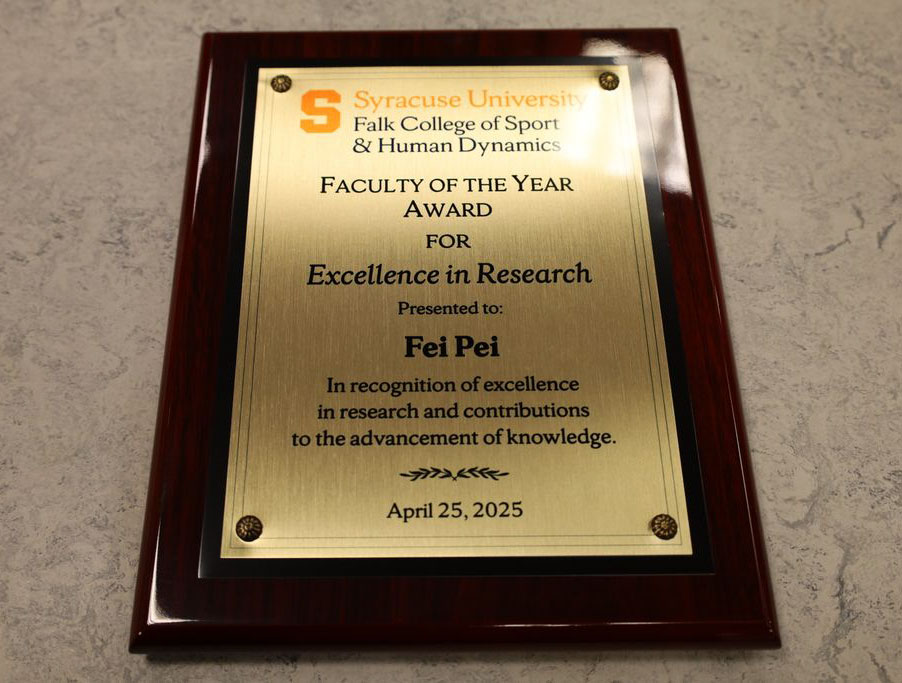
“Dr. Pei, who is in her fourth year in the School of Social Work, is a dedicated and productive researcher. Her advanced quantitative work demonstrates a clear research focus and trajectory and contributes to a crucial discourse in our field on the effects of neighborhood conditions, including violence, on children’s development.
“Fei has published 37 peer-reviewed articles in top-ranking interdisciplinary journals, including “Child Abuse and Neglect,” “Development and Psychopathology,” and “Children and Youth Services Review.” In 2024, she published four articles–three of which are first-authored–and submitted four additional manuscripts that are currently under review.
“In 2024, Fei also submitted four external grant applications, including three NIH (National Institutes of Health) applications for which she is principal investigator. Three of these applications are still under review and could use our collective good vibes!”
Gold Standard
Olympic gold medalist and visionary executive Benita Fitzgerald Mosley says it has been her lifelong mission to help people win gold medals in business–and in life.
“My gold medal is the gift that keeps on giving,” Fitzgerald Mosley says. “I am forever grateful, so I want to pay that gift forward.”
To get there, Fitzgerald Mosley highlights five “Olympic rings” to help people achieve their goals: Have a good start, set high goals, run your own race, power through hurdles, and have a strong finish.
“You have to ask yourself, why not me?’’ Fitzgerald Mosley says. “Why can’t I be the best in the world at what I do?”
From becoming the first African-American woman to win the 100-meter hurdles at the 1984 Olympics to her current role as chief executive officer of Multiplying Good, Fitzgerald Mosley has persistently broken barriers and advanced the idea that sport has the power to inspire and change the world.
Her enormous impact as a results-oriented leader in the Olympic, non-profit, and corporate worlds is why Falk College Dean Jeremy Jordan asked Fitzgerald Mosley to be the keynote speaker at the Falk Convocation at 12:30 p.m. May 10 in the Lally Athletic Complex.
“Benita’s ‘why not me?’ message encourages us to challenge societal expectations and embrace our potential, while Multiplying Good is helping people bring about positive change and inspiring them to do more,” Jordan says. “The life lessons and insights that Benita will share May 10 will provide valuable inspiration to our graduates and all of us.”
Using Fitzgerald Mosley’s five Olympic rings, here is her remarkable story:

Have A Good Start
Fitzgerald Mosley often uses a quote from former American politician and motivational speaker Les Brown, who said, “You don’t have to be great to get started, but you have to get started to be great.”
Fitzgerald Mosley’s parents, Fannie and Rodger Fitzgerald, were both educators and they encouraged Fitzgerald Mosley to get started in as many extracurricular activities as possible in their hometown of Dale City, Virginia. By participating in gymnastics, softball, majorettes, and track, and learning the piano, violin, flute and piccolo, Fitzgerald Mosley discovered what she loved and was good at and where to focus her attention.
“They were very supportive and stood by me in every aspect of my life,” Fitzgerald Mosley says of her parents. “They celebrated my every achievement, large and small, and I loved to make them proud.”
While she became the first chair flute for the Gar-Field High School symphonic band, Fitzgerald Mosley says she wasn’t very good at softball and grew too tall to be a gymnast. But middle school physical education teacher, family friend, and gymnastics coach Gwen Washington was also the coach of the track team and when it became obvious that Fitzgerald Mosley had outgrown gymnastics, Washington suggested she join the track team because she had seen Fitzgerald Mosley outrun the boys in gym classes.
“So I went out for the track team and started winning races from the very beginning,” Fitzgerald Mosley says. “It wasn’t until I was 12 years old and in the seventh grade that I even discovered my athletic prowess.”
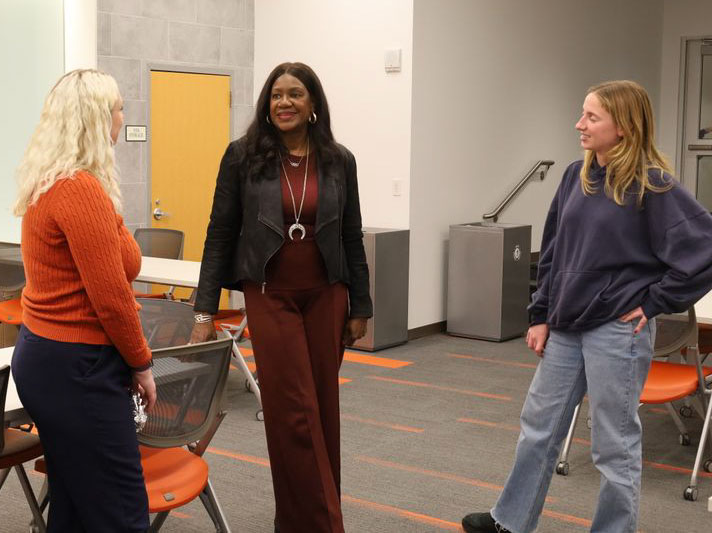
Set High Goals
As a high school freshman sprinter and hurdler, Fitzgerald Mosley helped the track team win its fourth consecutive Virginia state championship. She was a teammate of senior Paula Girven, who represented the United States in the high jump in the 1976 Olympics and qualified for the team in 1980. Their high school track coach, Anne Locket, also led the girl’s gymnastics and basketball teams to state championships.
“Coach Locket said to me, ‘You know, you can be an Olympian someday just like Paula,’ and I looked at her like she was from Mars,” Fitzgerald Mosley says, smiling. “But having a coach believe in you and say that to a youngster at 14 years old, it set me up for great things to come.”
By 1980, Fitzgerald Mosley was 18 and already a track star–and an industrial engineering major–at the University of Tennessee, where she would become a 14-time All-American and four-time NCAA hurdles champion. Like Girven, she made the 1980 Olympic team but didn’t participate because the United States led a boycott of the 1980 Summer Games in Moscow to protest the Soviet invasion of Afghanistan.
Fortunately for Fitzgerald Mosley, she was still in college and had the benefit of having access to coaching, training equipment, and the highest level of competition in college. This was a time when Olympic athletes were strictly amateurs who couldn’t make money off their athletic achievements, and many athletes who qualified for the 1980 Games, like Girven, weren’t able to return for the 1984 Games.
“At that point, people didn’t have these long careers spanning three- and four- and five-Olympic Games that started with my generation because they started to allow us to make money while we were competing,” Fitzgerald Mosley says. “The two other hurdlers that were on the Olympic team with me in 1980 didn’t make it again in 1984, so that was their one and only chance to be an Olympian.”
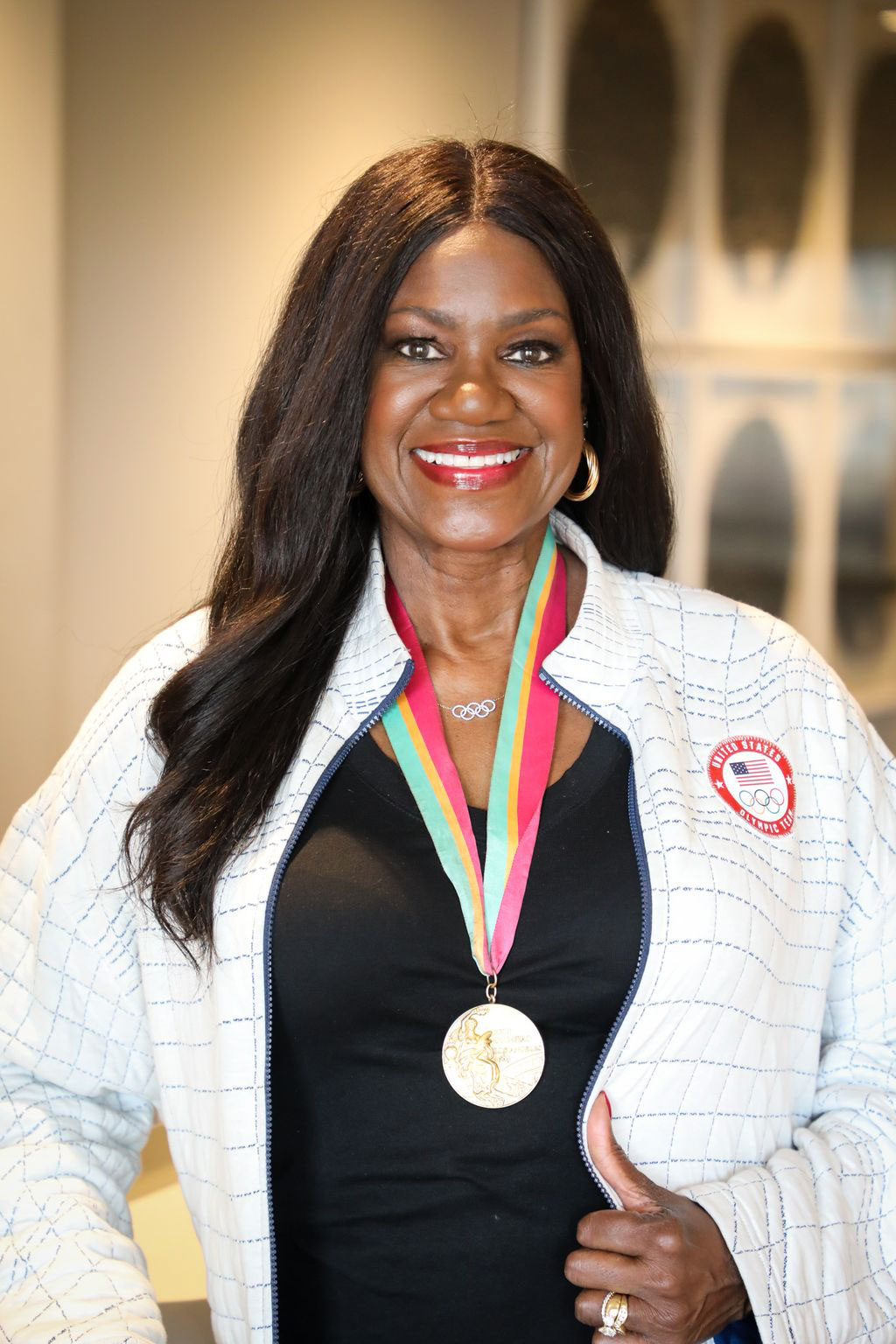
Run Your Own Race
For Fitzgerald Mosley, the last decade of her professional career has been similar to her Olympic performance where she kicked it into an even higher gear to beat the favorite, Great Britain’s Shirley Strong, and win the gold medal.
In 2016, she was named CEO of Laureus, a nonprofit organization that believes sport has the power to change the world. After stints as a senior advisor for Airbnb and president of the FundPlay Foundation, Fitzgerald Mosley was hired for her current position as CEO of Multiplying Good in July 2023. The mission of Multiplying Good is to help people reach their full potential and discover their power to deliver impact and bring about meaningful change.
“I really believe in– and care about–coming to work every day leading an organization that’s ultimately impacting people’s lives in a positive way,” she says. “That’s the utmost kind of thrill for me.”
Over time, Fitzgerald Mosley says all her experiences led to this moment of clarity where she realized she can help people and organizations win gold medals in life and business. That’s her daily focus, whether she’s leading Multiplying Good, serving on the Board of Directors for the Special Olympics, or speaking to a stellar group of graduates from Falk College.
“Where I can show up in the world is to truly help young people derive the benefits of sport participation in communities that otherwise wouldn’t have those opportunities, by funding those organizations, by helping them build their capacity so they could serve more young people, not just in the United States, but around the world,” Fitzgerald Mosley says.

Power Through Hurdles
Like one of Fitzgerald Mosley’s races, the line from Olympic gold medalist to influential executive may have been a relatively straight one, but not without its hurdles.
Fitzgerald Mosley’s bid for the 1988 Olympics was slowed by an ankle injury that required surgery in 1987. Still, she qualified for the Olympic trials and was leading in the finals before she tripped over the last hurdle and missed making the team by 1/100th of a second.
“The hardest team to make in the world is a U.S. team, particularly in swimming and track and field, where you pick yourself, no one picks you,” Fitzgerald Mosley says. “You have strep throat, you hit a hurdle, you fall in a race, you’re injured, sorry, you don’t get to go.”
Fitzgerald Mosley wasn’t able to capitalize financially on her Olympic success the way athletes can today, so she didn’t have a lot of money when she retired from running. But she did have her industrial engineering degree from Tennessee and found a job with a defense contractor, where she was working on projects such as conducting time and motion studies for the M1 Abrams tank or creating software design documents for the Seawolf submarine.
“Don’t get me wrong, these are all important things. And of course, I have the utmost admiration for the people who serve in our military,” Fitzgerald Mosley says. “But I just wasn’t the person to do that kind of work, and I think it was because it wasn’t aligned with my passion.”
After working as president and CEO of Women in Cable Telecommunications (now called The WICT Network), an organization dedicated to empowering women leaders, Fitzgerald Mosley started to hit her professional stride with jobs as Chief of Sport Performance for USA Track and Field and COO of the U.S. Olympic and Paralympic Committee.
“My career in both sport management and nonprofits was born at that point in time, when I realized I didn’t have to train three to six hours a day to participate in sport,” she says. “That was the big light-bulb moment for me to get that opportunity to work first for Special Olympics International and then with the Olympic and Paralympic Committee and have my heartstrings pulled by the mission of the organization.”
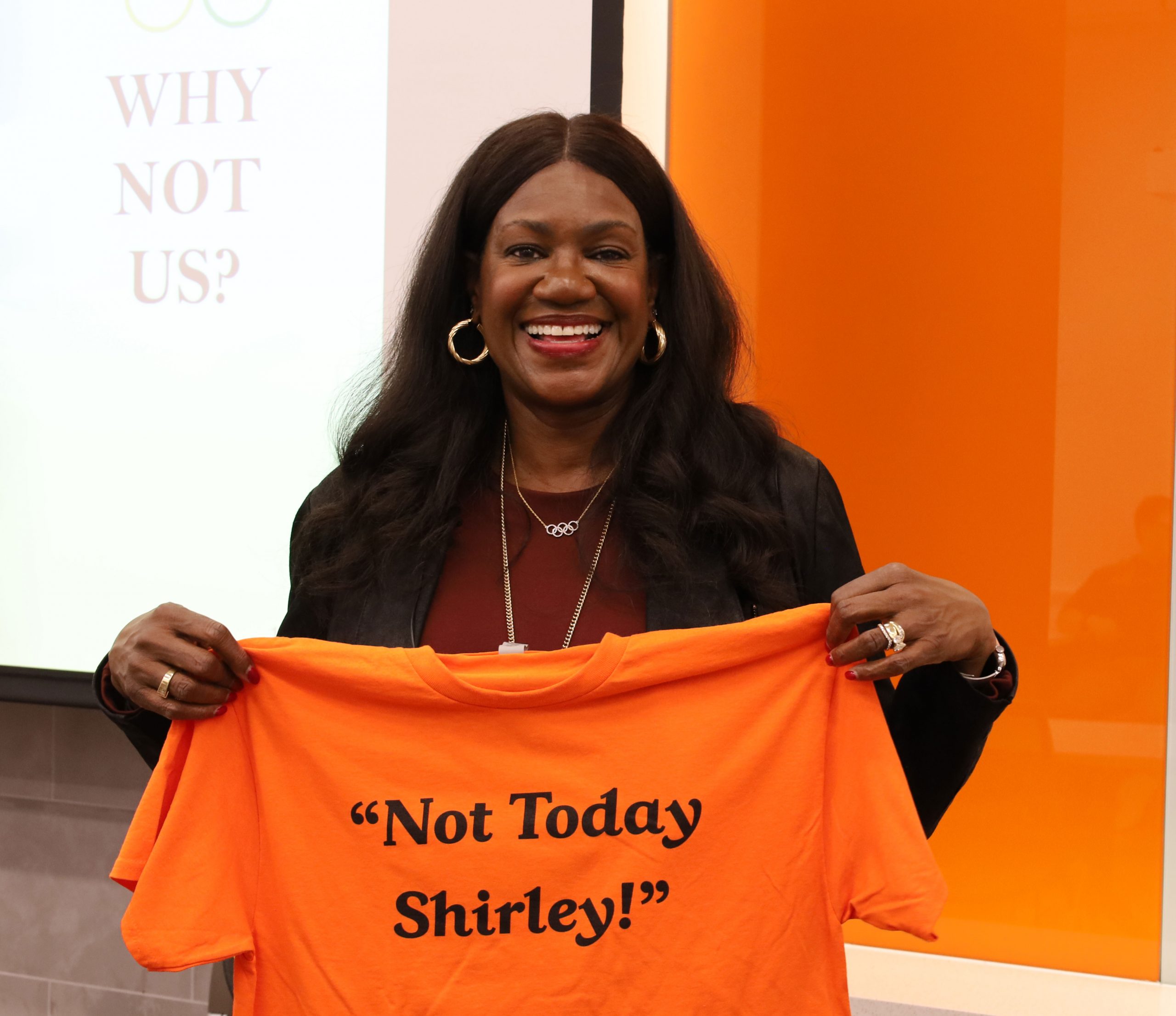
Have a ‘Strong’ Finish (a.k.a. Not Today Shirley)
Fitzgerald Mosley took full advantage of her second chance at the 1984 Olympic Games in Los Angeles, where she needed to beat Strong. At the 1983 World Championships, Strong had defeated Fitzgerald Mosley, a fitness fanatic who noticed that Strong was smoking cigarettes following their race.
“She’s smoking and she just beat me? She will never beat me again,” Fitzgerald Mosley told herself. “The next year (at the Olympics), I saw her smoking a cigarette between the semifinals and finals, and that reminded me of my vow.
“In the finals when we were racing, I saw her out of the corner of my eye, and I said to myself, ‘Not today Shirley,’’’ she says.
Fitzgerald Mosley ran the race in 12.84 seconds, beating Strong by 4/100th of a second to become the second U.S. woman and the first African-American woman to win a gold medal in the 100-meter hurdles. The 1984 track and field events were held in the Los Angeles Coliseum, where Babe Didrikson became the first U.S. woman to win what was then the 80-meter hurdles in 1932.
“It was magical,” Fitzgerald Mosley says. “To be on your home soil and walk into a stadium with 90,000 people screaming ‘U-S-A’ and cheering for you once you win, there’s nothing better.”
Fitzgerald Mosley has been inducted into several halls of fame, but she says perhaps her greatest honor occurred when she was selected as one of eight U.S Olympians to carry the Olympic flag into the stadium during the opening ceremony of the Centennial Olympic Games in Atlanta. Legendary boxer Muhammad Ali capped the ceremony by lighting the Olympic cauldron.
“We had practiced the night before under the cloak of darkness because no one knew who the eight of us were going to be that were walking in,” Fitzgerald Mosley says. “And we didn’t know Muhammed Ali was going to be the one who lit the torch.
“It had a mission impossible-type of feel to it, and that was pretty cool to be in on the inside of that little secret as well,” she adds.
Fitzgerald Mosley says she owes everything to her sport experiences, from winning the gold medal to her college education to meeting her husband, former Brown University football player Ron Mosley, with whom she has two grown children; a son, Isaiah, and a daughter, Maya, who runs track at the University of Maryland. She is most grateful to her parents, who encouraged her to get out there and keep trying until she found her passion.
“I would just say to young people in particular, don’t let your fear of failure get in your way of pursuing your dreams,” Fitzgerald Mosley says. “Because even if you fall somewhat short of the ultimate dream, you’re going to be so much further along toward that dream and that goal than you ever would have been if you didn’t start in the first place.”
Falk’s Finest
Graduate School Marshal Qingyang Liu will graduate on May 11 with a doctoral degree in human development and family science. She was honored recently at the One University Awards with the Chancellor’s Citation for Excellence in Graduate Research. Below, she talks about her five years at Syracuse—what she has accomplished and what her next step will be.
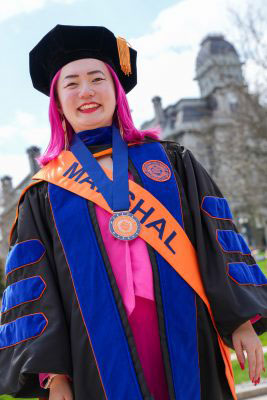
What attracted you to come to Syracuse University to complete your doctorate?
I was drawn to Syracuse University by its strong emphasis on rigorous research and the opportunity to work with Dr. Rachel Razza (associate dean of human dynamics in the Falk College and a professor of human development and family science), a nationally recognized scholar in self-regulation research. Her pioneering work deeply aligned with my own interests in how early poverty shapes children’s self-regulation. From the beginning of my application process, I was intentional about finding a program and mentor that supported both high-quality scholarship and meaningful community impact, and Syracuse offered the ideal environment to pursue both.
Tell me about your area of study within human development and family science in the Falk College.
As a developmental scientist, I adopt a lifespan perspective and use a strength-based approach to understand how children develop self-regulation throughout childhood, especially in the context of early poverty-related stressors. I study how these stressors interact with family dynamics and broader social environments, particularly among racially and ethnically minoritized families living in poverty. As an applied quantitative methodologist, I use advanced statistical methods, such as growth mixture modeling and latent profile analysis, on large-scale national and community-based datasets. These methods help identify critical periods in development when tailored interventions can make the greatest impact for vulnerable populations.
You were recently honored with the Chancellor’s Citation for Excellence in Research at the One University Awards and have appeared in 25 peer-reviewed publications. What can you share about your research and how it has developed during your time at Syracuse?

Across 25 peer-reviewed publications, including six first-authored papers in leading journals, I’ve drawn on large-scale national datasets (e.g., Future of Families and Child Well-being Study, Early Head Start) and community-based mindfulness intervention data to investigate self-regulation pathways among underserved children and youth. At the University, I received rigorous methodological training from faculty mentors, which enabled me to apply person-centered approaches to capture developmental heterogeneity and inform the design of targeted interventions.
What has been most meaningful is how Syracuse University has fostered my interdisciplinary and community-engaged scholarship. I collaborated with faculty across human development and family science, social work and education, contributed to research-practice partnerships and supported local preschool mindful eating workshops, translating findings into actionable insights for families facing adversity. Syracuse University has provided the mentorship, research training and collaborative environment that shaped me as a developmental scientist and applied quantitative methodologist.
What does it mean to you to be the Graduate School’s Class Marshal?
It is a huge honor and a deeply meaningful recognition of the past five years of dedication, perseverance and growth. This milestone reflects the collective support that has carried me through, from the steadfast mentorship and community within human development and family science to the Graduate School’s commitment to graduate student success. I am incredibly grateful for those who have believed in me along the way. I carry this honor with pride and renewed motivation to continue advancing research, equity and community well-being.
What is next for you after graduation?
I will begin a postdoctoral scholar position at Arizona State University, where I’ll continue my research on poverty-related adversity and children’s self-regulation development. I’m excited to expand my methodological training, collaborate with interdisciplinary teams and work closely with community partners to develop research that informs equitable interventions for children and families. I carry the mentorship, training and values I gained at Syracuse University with me into this next chapter.
A Syracuse University News story by Kelly Homan Rodoski originally published on April 20, 2025.
Significant Impact
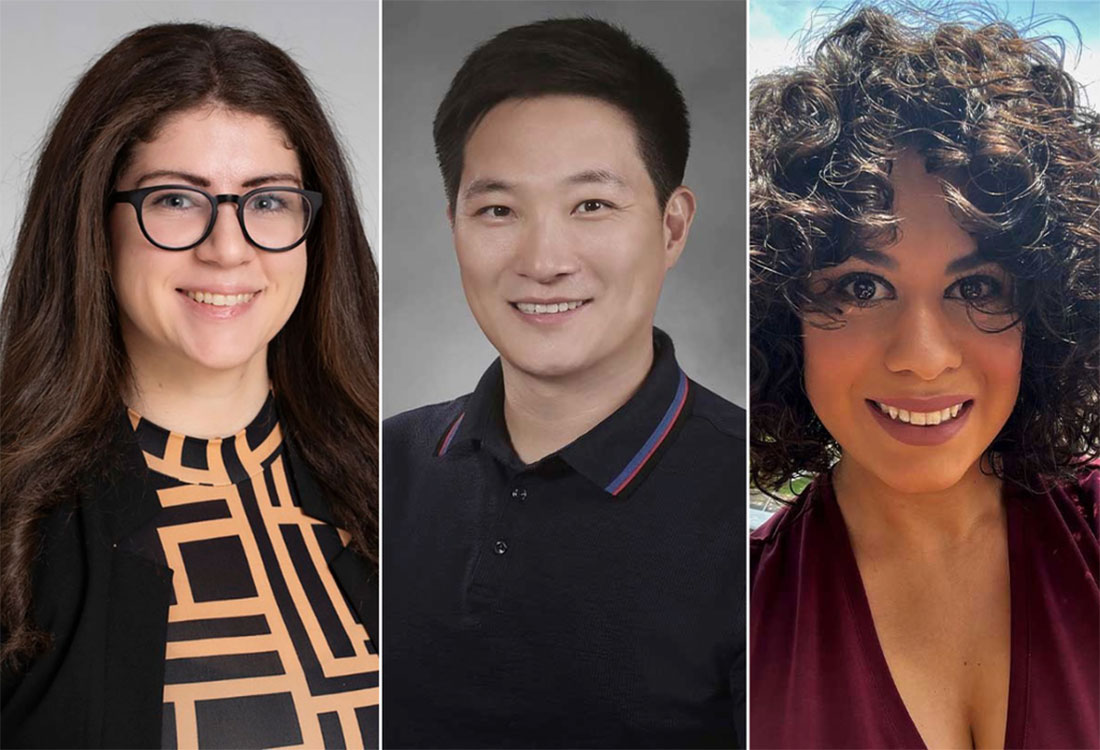
Syracuse University faculty members were honored with the Excellence in Graduate Education Faculty Recognition Award at a campus ceremony April 24. The award, given annually by the Graduate School, honors professors who have had a significant impact on graduate education through teaching, service and research or creative activities.
This year’s awardees, chosen by an interdisciplinary committee of graduate students, are the following:
- Nick Bowman, associate professor of communications, S.I. Newhouse School of Public Communications
- Catherine García, assistant professor of human development and family science, David B. Falk College of Sport and Human Dynamics
- Joon Young Kim, assistant professor of exercise science, Falk College
- Scott Landes, associate professor of sociology, Maxwell School of Citizenship and Public Affairs
- Claudia Miller, professor of mathematics, College of Arts and Sciences
- Angela Oliverio, assistant professor of biology, College of Arts and Sciences
- Natalie Russo, associate professor and associate chair of psychology, College of Arts and Sciences
- Yiyang Sun, mechanical and aerospace engineering, College of Engineering and Computer Science
- Eman Tadros, assistant professor of marriage and family therapy, Falk College
- Qiu Wang, professor of higher education, School of Education
“We know that talented faculty members are the cornerstone of a quality graduate education,” says Peter Vanable, dean of the Graduate School. “This awards program gives us an opportunity to hear directly from our students, as well as from faculty, staff and alumni, about which professors have had a significant positive influence on their studies. We are delighted to recognize these ten individuals for their dedication and contributions to the University.”
A Syracuse University News story by Wendy S. Loughlin originally published on April 25, 2025.
Parental Concerns

At least eight states have banned smartphones in public school classrooms, while 28 states (including New York) have proposed a ban on student smartphone usage. Other states are exploring a variety of ways to limit cell phone usage.
Proponents argue that students need to have their undivided attention focused on classroom lessons; parents feel strongly about being able to contact their child in an emergency.
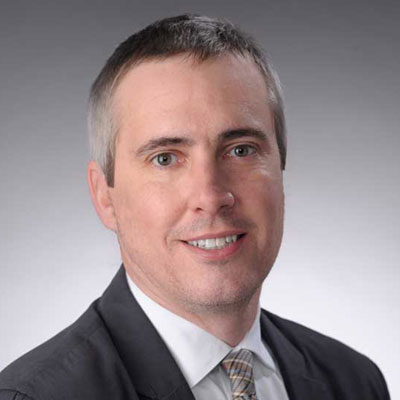
Matthew Mulvaney, associate professor and department chair of human development and family science in the Falk College of Sport and Human Dynamics, looks at the impact of cell phone use on children as a researcher and also has firsthand knowledge as the parent of a 14-year-old.
“I’ve always been interested in this field and this research of looking at mobile technology and how it might impact kids, especially now with my daughter being immersed in the world of cell phones and social media,” says Mulvaney, a parenting researcher whose focus is on how parents and families support optimal child development.
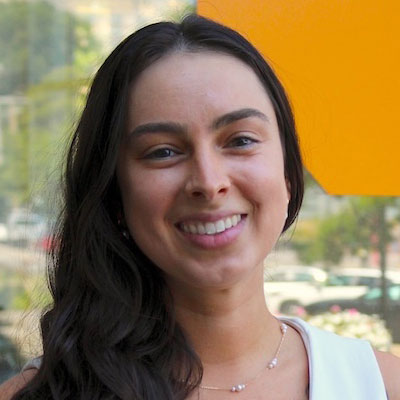
Butler sees both sides of the debate and suggests ways to find the balance.
“Parents have a legitimate concern about the safety of their child, and it would be difficult to enforce no cell phones in schools,” says Butler, whose research focuses primarily on process addictions in children and adolescents. “Plus, a lot of kids use tablets or Chromebooks in the classroom. We can’t just take technology completely out of the classroom. How do we ensure they’re not distracted by social media or games while they’re supposed to be learning?”
Mulvaney and Butler sat down with SU News to discuss cell phone bans and limits in schools and what steps can be taken to help children liberate themselves from their phones.
What are your thoughts on limiting the use of cell phones in school and the impact of cell phone use on adolescent development?
Sabrina Butler:Coming from a harm reduction lens, we want to put limits and boundaries on cell phone usage. And while there isn’t research that necessarily supports that cell phone usage is causing depression and anxiety, what we do know is that our cell phones are like other addictions out there. If you have individuals that are already experiencing anxiety, depression or self-esteem issues, being on your phone and on social media is going to exacerbate that.
Matthew Mulvaney: Kids functioned for a very long time in schools without cell phones. More people are starting to be concerned about cell phone use. Parents see the changes their kids are going through and they want them to not be so tied up with their phones.
There’s a psychologist, Jean Twenge, who published a book in 2017 that showed the impact of cell phone usage and social media on this generation. Around the age of 11, 12 or 13, children, particularly girls, experience this mental health cliff where their well-being drops off suddenly, and how much time they spend on their phones and on social media is closely correlated and negatively associated with their mental health.
How is being on your cell phone a process addiction?
Butler: Process addictions hack and utilize the same brain mechanisms as other addictions, like nicotine. With cell phones and social media, we’re pairing these positive emotions with external stimuli, which is the behavior. That’s where it can become problematic, wiring those two things [phones and social media] together that make me feel good or less stressed. It’s that feeling that we’re getting addicted to and we’re associating with that behavior.
How young is too young for a child to get a cell phone? To be active on social media?
Mulvaney: The later you can wait, the better. Kids will say not having one cuts them off from their social networks and that all their friends have phones, but there are few developmental benefits to having one early on. As for social media, researcher Jonathan Haidt studies the impact of social media on adolescent mental health, and he suggests 16 for starting off on social media.
What can we do to help alleviate the addictive impact of cell phones?
Mulvaney: I see a lot of parallels with cigarette smoking. Smoking was commonplace when I was growing up, but smoking cigarettes has basically gone away from the adolescent experience because of how bad it was for our kids. It took a collective understanding, a collective will to say, “we’re not going to have spaces for kids to smoke.”
I think schools will adopt a phone-free policy from 8 a.m. to 4 p.m. and that will have a significant impact on changing the expectations of being on your phone all the time. If we come to this shared understanding that being on your phone all the time is really bad, we can make changes in the same way we did with smoking.
Butler: It goes back to limits and an age barrier. Some parents take away phones at night because they don’t want their child up all night on their phone. Others turn off the Wi-Fi after a certain point. Those parental control measures are really helpful because they lead into how we monitor usage among children.
We need to get back to engaging with each other, having family dinner without looking at our phones. Getting children active through activities and sports are great because they get kids out playing, interacting and connecting with their peers.
Giving Day at Falk!
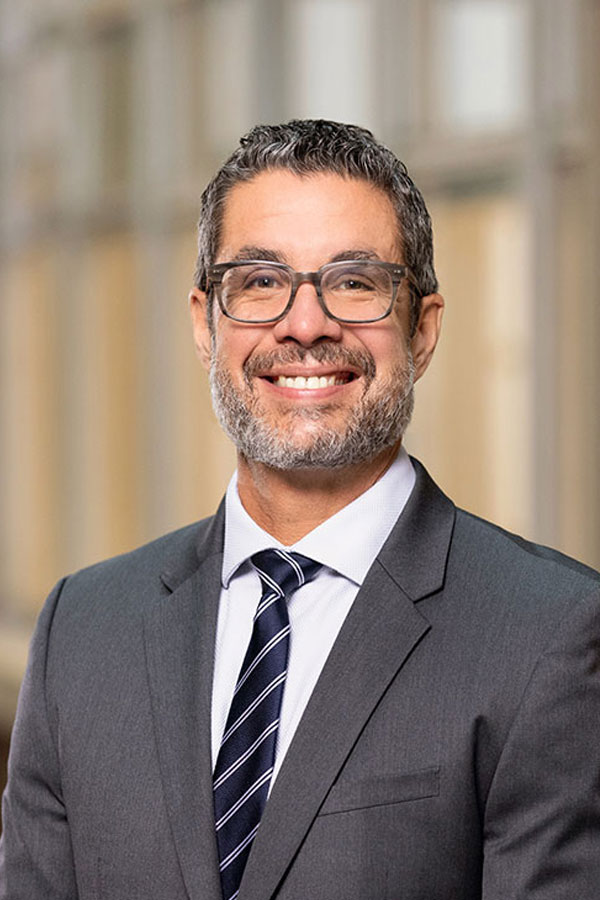
Dear Falk College Family,
Happy Syracuse University Giving Day! March 27 is the day when Syracuse’s global community unites for 24 hours of impact, friendly competition, and plenty of Orange pride!
Here in Falk College, we’re promoting giving that provides Falk students with transformative learning experiences from the classroom to the community and around the globe.
You have several giving options. Visit our campaign page to give directly to the Falk College Dean’s Fund, or visit our giving page if you’d like to give to a different fund that will support students in a specific program. For our friends in the human dynamics’ programs, please know that gifts to your programs will follow you to your new homes in Arts and Sciences, the Maxwell School, and the School of Education.
Please consider making a gift today to help our students reach their full potential!
Sincerely,
Jeremy S. Jordan, PhD
Dean and Professor
Falk College
Page 1 of 25
